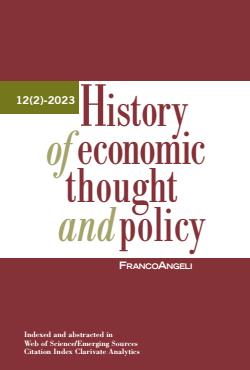
HISTORY OF ECONOMIC THOUGHT AND POLICY
2 issues per year, ISSN 2240-9971 , ISSNe 2280-188X
Printed issue price (also old issues): € 73.50
E-book issue price (also old issues): € 62.50
Subscription fees 2024
Institutional subscriber, companies
- Online only (VAT excluded) 157.00
- Print Italy (VAT included) 148.00
- Print Other countries (VAT included) 230.50
- Info about print subscription
- Info about online licences
Universities
online (current + back issue, perpetual access, plus licence)